That Defining Moment When A Woman Tells Her Boyfriend That She Doesn't Like His Little Yappy Dog
It turns out that small dogs are known as yippy, yappy barkers. This can sometimes be a result of training rather than genetics.
Every dog lover is aware that their dog will eventually start to bark. Small dogs have a reputation for being a little yappy and barking more frequently, which those of us who own them will attest to (though they might see it as yaps).
Why do little dogs bark so much, though? Barking all day and all night from your dog can be pretty annoying. Despite the fact that not all little dogs bark a lot, many owners feel it is a prevalent characteristic of their behavior.
You might be curious as to why little dogs bark more than large ones. Because each dog is different, they all have distinct reasons for barking.
Your dog's yapping could be due to a variety of factors, including tiny dog syndrome and anxiety. We can’t really tell why the dog in today’s AITA story yaps, but it’s pretty clear that the dog is adored by its owners.
The OP is not a dog person, but she has great respect for "police dogs, sheep dogs, guard dogs, alert dogs, and basically just working dogs." However, for her boyfriend’s little dog, she believes that the dog yaps... a lot... and she just cannot stand it.
The OP knows that she sounds horrible but hold on and hear her out first
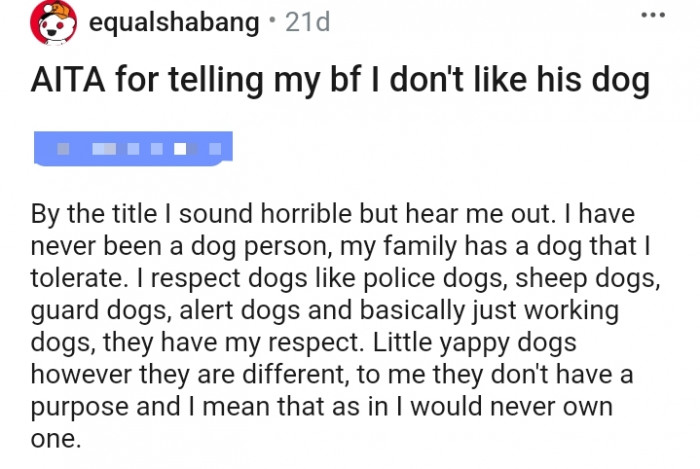
Her BF has a little yappy dog
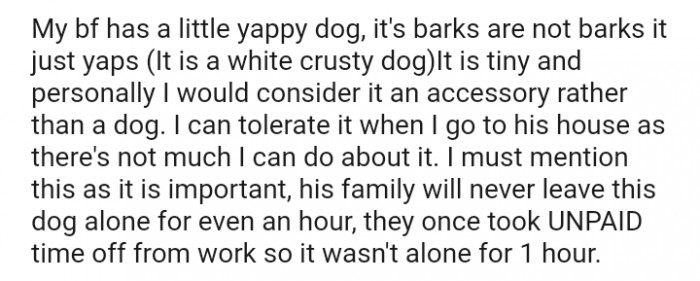
It did not pick me, especially on my face
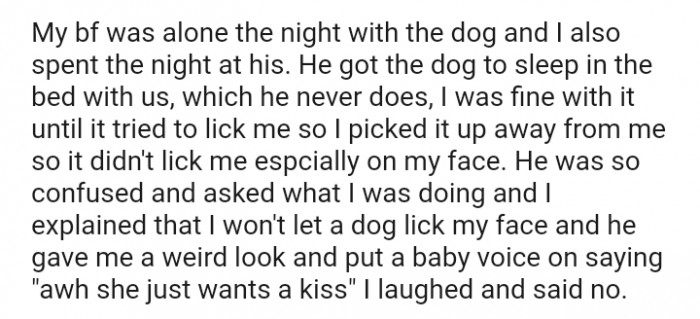
Perceptions of Pets in Relationships
Dr. Rachel Green, a relationship expert, explains that differing perceptions of pets can create significant tension in relationships.
Research indicates that individuals often project their values onto pets, viewing them either as family members or mere accessories, leading to conflict when partners hold opposing views.
The Dynamics of Personal Preferences
This incident reveals the complexities that arise when personal preferences clash in relationships. Research indicates that when partners have divergent views on what constitutes a pet, it can lead to significant conflict. As Dr. Gary Chapman, a renowned marriage counselor, states, "Differences in preferences, especially regarding pets, can highlight deeper issues of compatibility and understanding within a relationship." Furthermore, Dr. Esther Perel, a prominent couples therapist, emphasizes that "conflicting preferences can often serve as a mirror, reflecting underlying needs for autonomy and control." These insights underscore the importance of addressing such differences constructively.
He sent me a million dog pictures

Below are some of the comments by Redditors
1. Anyone that describes a dog as an accessory is a...

2. Those are incompatible traits
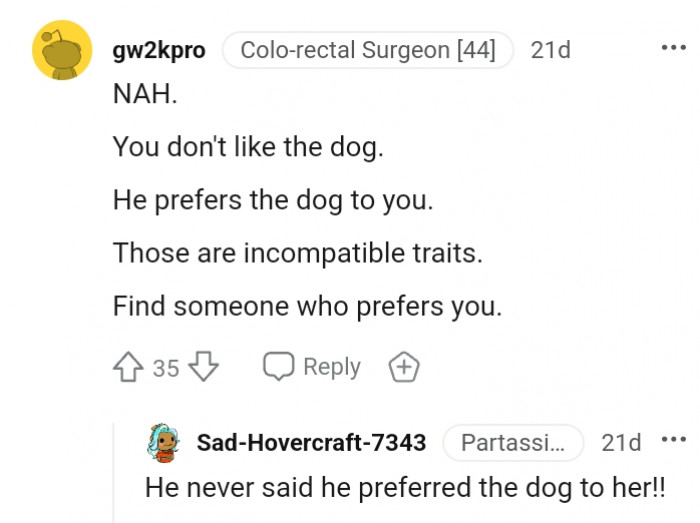
Studies in social psychology reveal that pets can serve as symbols of status or emotional attachment, influencing how individuals relate to each other in romantic contexts.
This dynamic can complicate relationships when partners have contrasting views on the significance of pets.
In this case, the woman's preference for a 'real' dog versus her boyfriend's smaller dog may reflect broader themes of identity and personal values. A psychologist specializing in relationships notes that such preferences often embody deeper issues of self-expression and compatibility.
Understanding the motivations behind these preferences can foster empathy and constructive dialogue between partners.
3. You don't date people that have what you hate
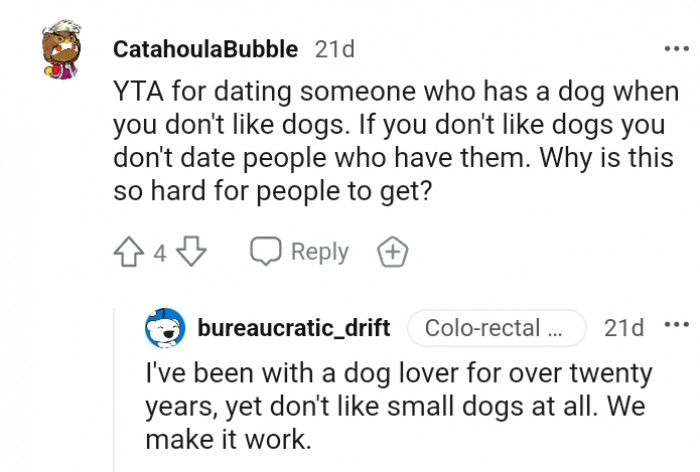
4. A side that is cold and dramatic

5. It's okay not to like the dog
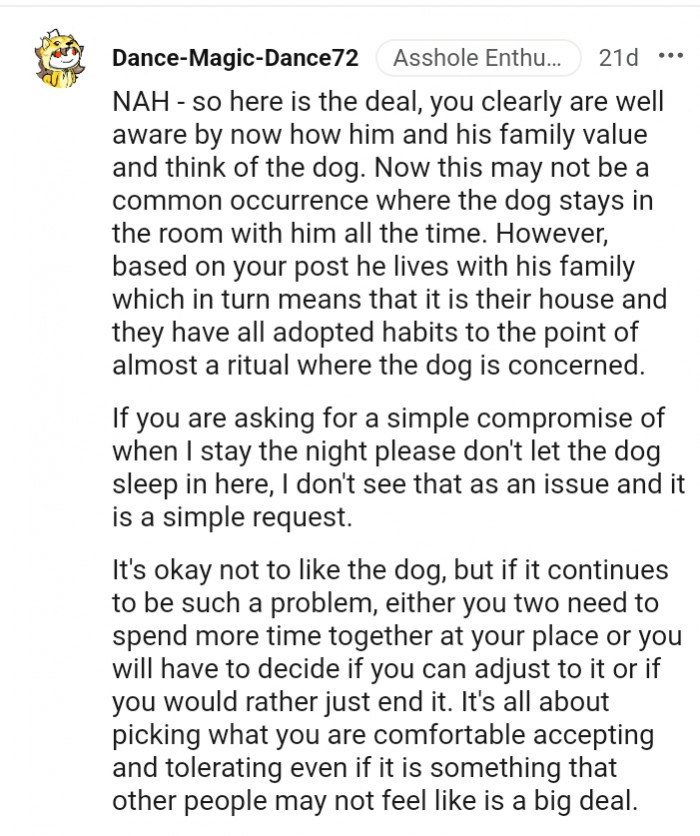
The Importance of Shared Values
According to relationship specialists, shared values around pets can significantly enhance relationship satisfaction.
Research suggests that couples who align on issues related to pet ownership are more likely to experience harmony in their relationships.
Compromise and Relationship Satisfaction
Compromise is essential in relationships, particularly when it comes to personal preferences. Studies show that couples who practice compromise tend to experience higher satisfaction and emotional intimacy.
Engaging in open discussions about personal preferences regarding pets can help partners find common ground and strengthen their bond.
6. He just might choose the dog over you

7. This Redditor thinks the relationship won't work

8. What this Redditor does not like are rabbits
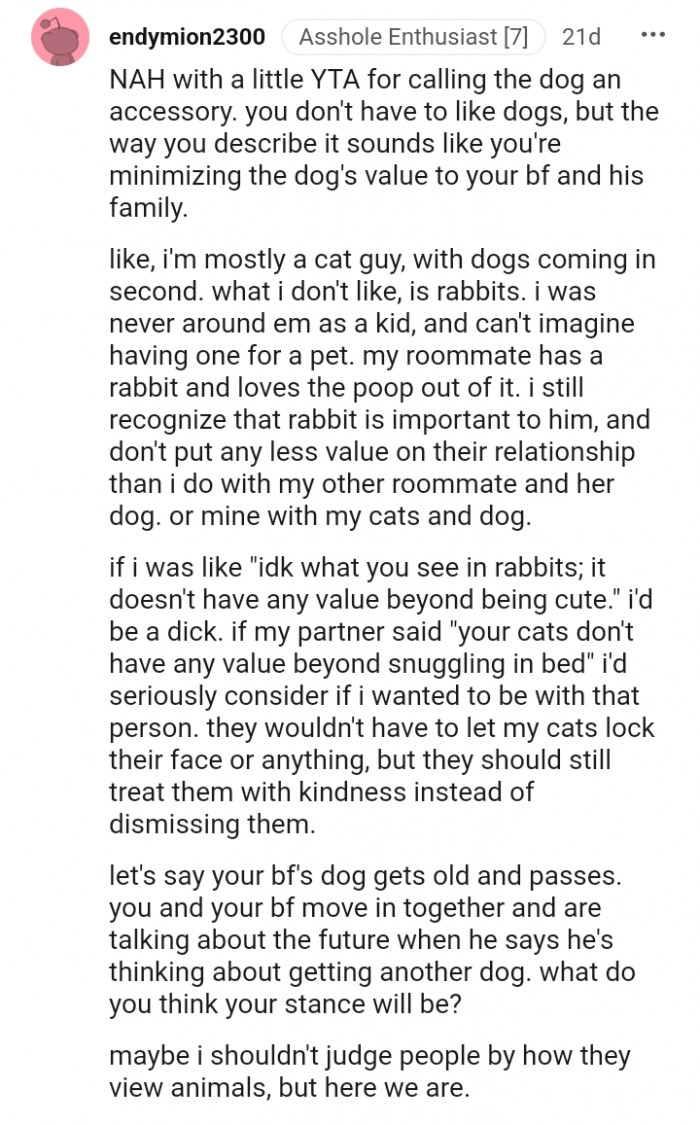
Couples are encouraged to engage in discussions about their views on pets early in their relationships to prevent misunderstandings.
By establishing a shared understanding, they can better navigate potential conflicts related to their pets.
Couples should consider creating a shared list of pet qualities that matter to both partners. Research indicates that collaborative decision-making fosters a sense of partnership and mutual respect, ultimately enhancing relationship satisfaction.
This approach can help ensure both partners feel valued and heard.
9. He is a dog person and you're not

10. You may just not be compatible with your boyfriend

11. Tell your BF what bothers you

Understanding Attachment Styles
Psychologists note that attachment styles can influence how individuals perceive and interact with pets.
Research shows that those with secure attachment styles tend to have more positive relationships with pets, viewing them as companions rather than possessions.
The Role of Emotional Expression
This situation also underscores the importance of emotional expression in relationships. Research indicates that partners who openly share their feelings tend to navigate conflicts more effectively.
In this case, articulating feelings about the dog may provide insights into deeper emotional needs and preferences.
12. Something has to change as you guys are not compatible

13. Not everyone wants to be licked and jumped on
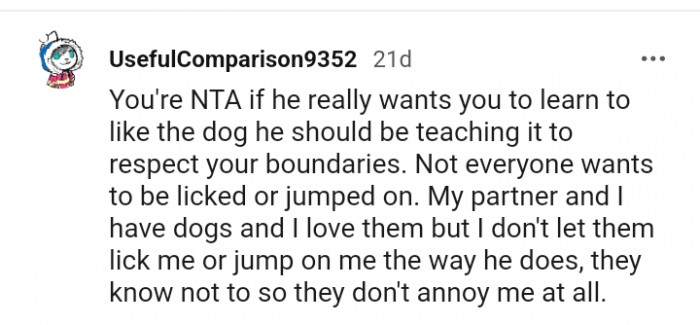
14. His dog is a huge part of his life
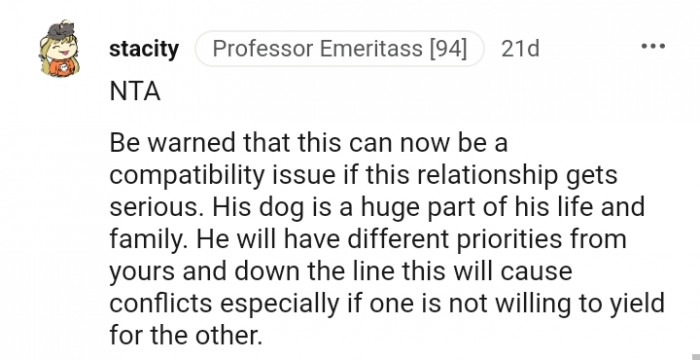
Couples can benefit from exploring their attachment styles and how they shape their perceptions of pets.
This exploration can foster empathy and understanding in their relationship.
Couples can benefit from practicing active listening during discussions about sensitive topics. This technique encourages partners to validate each other's feelings and fosters a supportive environment for open dialogue.
Studies have shown that active listening can enhance emotional intimacy and reduce conflict.
15. If you don't tell him, he can't guess the problem
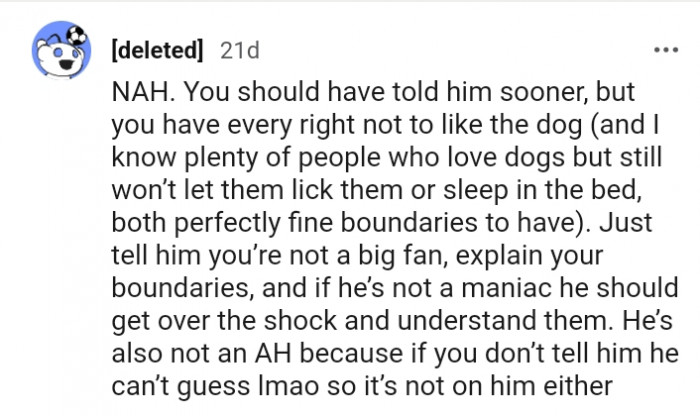
16. This Redditor thinks the OP's boyfriend needs a new partner

17. The man sounds like he wants a dog in his life

Coping with Conflict
Conflict resolution specialists emphasize the need for effective communication when discussing differing views on pets.
Research indicates that open dialogue can reduce misunderstandings and foster greater intimacy in relationships.
Exploring Compatibility Issues
This incident also raises questions about compatibility in relationships. Research indicates that compatibility in values and preferences is a significant predictor of relationship satisfaction.
Understanding each other's backgrounds and values regarding pets can lead to greater empathy and understanding.
18. Two years is already a long time

19. Maybe you should have clued him in earlier on

20. I wouldn't trust you to be around my dogs
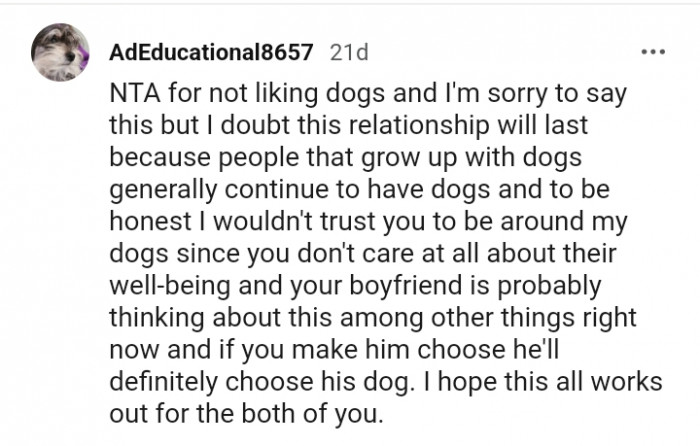
Implementing regular check-ins on pet-related issues can help partners stay aligned and address concerns before they escalate.
This proactive approach can contribute to a healthier relationship dynamic.
Couples should engage in conversations about their values and preferences regarding pets early in the relationship. Research shows that discussing such topics can prevent misunderstandings and foster a stronger bond.
Establishing shared values can create a foundation for a healthier relationship.
A dog’s yapping can be triggered by many factors, including stress, excessive energy, or a lack of training. However, the owners of the dog in this story do not see anything wrong with the dog.
So it’s safe to say that the OP doesn’t like the dog because she’s not a dog person, or don’t you think so? Let us know your thoughts by dropping a comment below.
The Importance of Flexibility
Finally, flexibility is crucial in navigating differences in relationships. Studies suggest that individuals who can adapt to each other's preferences tend to experience greater relationship satisfaction.
Being open to compromise and negotiation can help partners navigate preferences around pets and other shared responsibilities.
Psychological Analysis
This situation illustrates how personal preferences can lead to significant conflicts in relationships. It's important for partners to engage in open discussions about their feelings to prevent misunderstandings.
Developing a mutual understanding of each other's preferences can enhance relationship satisfaction.
Analysis generated by AI
Analysis & Alternative Approaches
These insights highlight the importance of understanding personal preferences and emotional dynamics in relationships. Open communication, compromise, and flexibility are essential for fostering a healthy partnership.
Ultimately, navigating differences with empathy and understanding can strengthen the bond between partners.
Emotional Regulation in Disagreements
Managing emotional responses during disagreements about pets is crucial for constructive communication.
Studies show that emotional regulation strategies can significantly improve conflict resolution outcomes.
Analysis & Alternative Approaches
In conclusion, differing perceptions of pets can create significant challenges in relationships.
By fostering open communication and shared values, couples can navigate these conflicts more effectively and strengthen their emotional connection.



